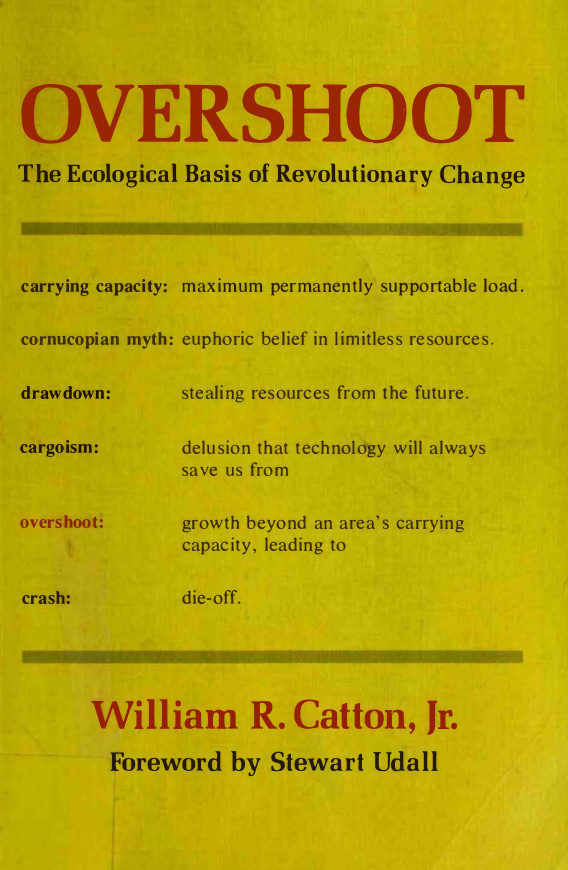William R. Catton, Jr.: Overshoot: The Ecological Basis of Revolutionary Change (1980)
Filed under book | Tags: · biology, earth, ecology, environment, human ecology, sociology

This famous book outlines William R. Catton’s realization of “the urgent need for everyone, including sociologists, to recognize that our lifestyles, mores, institutions, patterns of interaction, values, and expectations are shaped by a cultural heritage that was formed in a time when carrying capacity exceeded the human load. A cultural heritage can outlast the conditions that produced it. That carrying capacity surplus is gone now, eroded both by population increase and immense techno-logical enlargement of per capita resource appetites and environmental impacts. Human life is now being lived in an era of deepening carrying capacity deficit. All of the familiar aspects of human societal life are under compelling pressure to change in this new era when the load increasingly exceeds the carrying capacities of many local regions—and of a finite planet. Social disorganization, friction, demoralization, and conflict will escalate.” (Catton, 2008)
Publisher University of Illinois Press, 1980
ISBN 0252009886
xvii+298 pages
PDF (16 MB, glossary missing)
Comment (0)Gene Kogan, Francis Tseng: Machine Learning for Artists (2016–)
Filed under handbook | Tags: · art, artificial intelligence, code, deep learning, generativity, language, machine learning, neural networks, programming, software, style

“This is an in-development book about machine learning. The first draft is expected early-2017. Some chapters are nearly complete, some are very rough, some are just stubs.
Guides and Demos are being released as we go. Guides are a collection of practical resources for working with machine learning software, including code and tutorials. Demos are are a collection of figures and interactive demos for highlighting important concepts in machine learning, and supplementing the book’s materials.”
Chapters (HTML)
Guides (HTML, Python)
Demos (HTML, Javascript)
Ricardo Greene, Iván Pinto (eds.): La zona Marker (2013) [Spanish]
Filed under book | Tags: · cinema, documentary film, experimental film, film, film criticism, video art

This tribute book to Chris Marker is “divided into three chapters, each one of them dedicated to a different cutting edge point that can be found throughout his life and works: the first is about the committed militant and includes articles by Trevor Stark, Carolina Amaral De Aguiar and Chris Marker himself; the second deals with the explorer who ventures into unknown cultures, with unedited works by María Paz Peirano, Maria Luisa Ortega and Gonzalo De Lucas; the third and last is about his innovative use of the audiovisual language and includes edited essays by Raymond Bellour, Eduardo Russo and Wolfgang Bongers. Furthermore, an introductory piece by the editors and a letter by Patricio Guzmán, besides illustrations and video frames is included. This is a book not just for the fan, but for anyone who wants to delve into the vague fringes of his lasting legacy.”
“El 29 de julio de 2012, día en que cumplía 91 años, Chris Marker muere en Francia por causas desconocidas. Fuera de ambas fechas, nacimiento y muerte, poco puede decirse de él con seguridad; sin ir más lejos, ni siquiera su nombre. Nacido como Christian François Bouche-Villeneuve, en Youtube era Kosinski, en Flickr era Sandor Krasna y en sus películas firmó como Jacopo Berenzi, Fritz Markassin y Hayao Yamaneko. Su obra también rehuyó la etiqueta facíl, combinando ficción, documental, experimental, video arte e incluso ciencia ficción, y ensayando con cine, fotografía, caricaturas, instalaciones, animaciones y realidad virtual. Con todas ellas hizo mezclas inesperadas, camuflando y transmutando elementos hasta que sólo quedaran rastros y ruinas.
A través de once ensayos inéditos provenientes de diversas latitudes, el presente libro aborda la compleja y prolífica figura de Marker en sus multiples variantes. Una mirada critica a una obra tan inasible como las sombras del siglo que exploró.”
Publisher FIDOCS, Santiago de Chile, 2013
ISBN 9789569069024
177 pages
via ChrisMarker.org
PDF (6 MB)
Academia.edu

